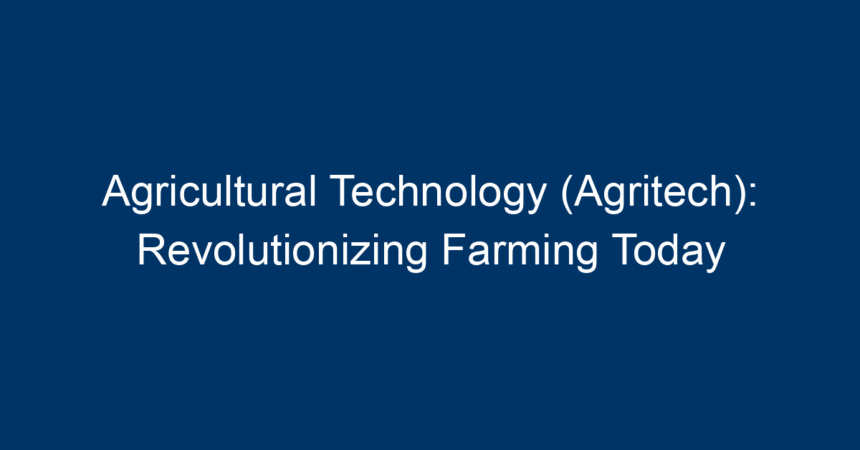Agricultural technology (agritech) is transforming the landscape of modern farming, bridging the gap between tradition and innovation. As the global population surges and climate change poses ever-growing challenges, agritech emerges as a beacon of hope, providing farmers with the tools they need to increase efficiency, productivity, and sustainability. In this article, we will delve into the various dimensions of agritech, its benefits, and its future impact on the agriculture sector.
Understanding Agricultural Technology (Agritech)
Agricultural technology (agritech) encompasses a range of innovations designed to improve the processes involved in farming. This includes everything from genetically modified organisms (GMOs) and precision farming techniques to the use of drones, sensors, and data analytics. The goal is not just to improve yields but to enhance sustainability, reduce waste, and make farming practices more efficient and profitable.
The Importance of Agritech in Today’s Farming
With an expected world population of nearly 10 billion by 2050, the demand for food will skyrocket. Demand alone isn’t the only challenge; water scarcity, soil degradation, and climate change further exacerbate the situation. Agricultural technology (agritech) responds to these challenges by offering innovative solutions that can adapt to changing environmental conditions.
Key Innovations in Agritech
-
Precision Agriculture
Precision agriculture utilizes GPS technology, IoT devices, and data analytics to monitor crop health and soil conditions in real time. This approach enables farmers to apply fertilizers, pesticides, and water only where needed, minimizing waste and maximizing yield.
- Benefits: Increased efficiency, reduced costs, and improved environmental sustainability.
-
Drones and Aerial Imaging
Drones equipped with high-resolution cameras and multispectral sensors are revolutionizing crop monitoring. These devices can assess crop health, identify irrigation issues, and even predict yields.
- Benefits: Aerial imaging provides a broad perspective on field conditions, allowing for quick responses to emerging issues.
-
Biotechnology and GMOs
Genetic engineering allows scientists to create crops that are resistant to pests, diseases, and extreme weather. This biotechnology not only boosts food production but also reduces the reliance on chemical pesticides.
- Benefits: Higher resilience to climate issues and reduced agricultural waste.
-
Automated Machinery
Automation in farming is increasing with the advent of robotic harvesters, seeders, and planters. These machines can work around the clock, reducing labor costs and improving efficiency in planting and harvesting.
- Benefits: Enhanced productivity and reduced labor dependency, which is vital in a workforce-strapped agriculture sector.
-
Vertical Farming
As urbanization continues, vertical farms that utilize hydroponics and aeroponics are gaining traction. These systems allow for year-round crop production in controlled environments, minimizing the need for arable land.
- Benefits: Space-efficient, reduced transportation costs, and fresher produce available to urban populations.
The Role of Data Analytics in Agritech
Data analytics is a cornerstone of agricultural technology (agritech). By collecting and analyzing data from various farm operations, farmers can make informed decisions that impact productivity and sustainability.
- Predictive Analytics: Agritech companies develop models that forecast crop performance based on weather patterns, pest outbreaks, and market trends.
- Farm Management Software: Platforms that integrate multiple data points help farmers manage their operations more efficiently, promoting informed decision-making.
The Environmental Impact of Agritech
Agricultural technology (agritech) is significant not only for its economic benefits but also for its positive environmental impact. Sustainable farming practices reduce carbon emissions, soil erosion, and water usage while promoting biodiversity.
-
Water Management Technologies
Drip irrigation and moisture sensors help optimize water usage, an essential aspect of sustainable agriculture. By delivering water directly to the root zone, farmers can significantly reduce waste and increase crop yields.
-
Soil Health Monitoring
Advanced sensors and soil health analytics allow farmers to monitor nutrient levels and soil composition, enabling them to maintain optimal growing conditions and reduce the need for chemical fertilizers.
Challenges Facing Agritech Adoption
Despite its many benefits, the widespread adoption of agricultural technology (agritech) faces several challenges:
-
High Initial Investment
Implementing agritech solutions can require significant financial investment, which may be a barrier for smallholder farmers.
-
Technology Literacy
Many farmers lack the necessary technical skills to operate advanced machinery and software, making training programs essential for successful implementation.
-
Data Privacy Concerns
As data collection becomes integral to enhancing agricultural practices, farmers may express concerns about data ownership and privacy.
The Future of Agricultural Technology (Agritech)
The future of agricultural technology (agritech) is ripe with potential. Continued advancements in artificial intelligence, machine learning, and robotics will drive innovation and efficiency even further. Collaborative efforts between agritech startups and traditional agricultural corporations will also pave the way for hybrid solutions that address both modern needs and traditional values.
Real-World Applications of Agritech
Around the globe, agritech innovations are making waves in various ways:
- India has seen a rise in mobile apps that provide farmers with critical information about market prices, pest outbreaks, and weather forecasts.
- The Netherlands, known for its advanced greenhouse technology, is leading in vertical farming and automated systems to maximize limited land resources.
- Australia has adopted precision agriculture methods to enhance water efficiency and manage drought conditions.
Conclusion: Embracing the Agritech Revolution
Agricultural technology (agritech) is not just a trend; it is a necessity in our ever-changing world. By harnessing the power of innovation and data, farmers can produce more food with fewer resources while protecting our planet.
As we move forward, it is imperative to continue investing in agritech innovations, addressing the barriers to adoption, and ensuring ethical practices in data management. Agricultural technology (agritech) holds the promise of a sustainable future, and by embracing these advancements, we can revolutionize farming today and cultivate a better tomorrow for generations to come.
Actionable Insights
-
Stay Informed: Keep up with the latest agritech trends and innovations to understand how they can benefit your farming practices.
-
Invest in Training: If you are a farmer or agricultural manager, invest time and resources in training yourself and your team on new technologies.
-
Network with Agritech Startups: Collaborate with startups that offer innovative solutions tailored to your specific agricultural challenges.
-
Utilize Data Wisely: Embrace data analytics as a cornerstone of your farming operation to make informed decisions that improve yield and sustainability.
- Advocate for Policies Supporting Agritech: Engage with policymakers to advocate for support in the form of subsidies, training programs, and infrastructure development that will encourage the adoption of agricultural technology.
By taking these actionable steps, you can be part of the agritech revolution and significantly enhance your farming practices for the future.




